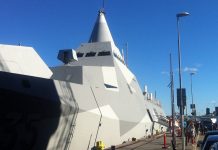
The announcement, made via the EU’s TED tender portal on 28 February, comes almost precisely a month after the Danish Ministry of Defence finalized its internal selection of a supplier.
In a statement released the same day, the Danish Acquisition and Logistics Organization (DALO) indicated that a 10-day standstill period would take place before the commencement of final contract negotiations. Atlas Elektronik, proposing a system based on its Active Towed Array Sonar (ACTAS) technology, was chosen over a competing bid from Thales.
The plan to upgrade the anti-submarine warfare (ASW) capabilities of the Absalon-class vessels, HDMS Absalon and HDMS Esbern Snare, was first introduced as part of Denmark’s 2018-2023 Defence Agreement. DALO initiated the procurement process in late 2020, but the original competition was canceled in June 2023 due to evolving requirements influenced by Russia’s invasion of Ukraine in February 2022. According to DALO, the geopolitical landscape, along with the inclusion of Finland and Sweden in NATO, shifted Denmark’s ASW priorities, necessitating improved operational capabilities to conduct ASW missions in the North Atlantic in cooperation with allied forces.
As a result, DALO issued a revised tender for a Low Frequency Active Towed Array Sonar (TAS), specifying the need for a dedicated blue-water ASW system that would be compatible with Denmark’s existing sonar infrastructure. The system needed to function effectively in both bistatic and multistatic sonar environments and serve as the primary sensor for future torpedo countermeasure systems.
The tender also required that the TAS components fit within a restricted space at the stern of the Absalon-class ships. Additionally, the deployment and recovery of the TAS ‘wet end’ had to be achieved without manual mechanical connection or disconnection by deck crew. Other deliverables included a shore-based TAS simulator, training services, and an in-service support contract potentially spanning up to 25 years.
On 29 January, the Danish Ministry of Defence announced that a supplier had been selected but did not initially disclose the chosen bidder. Defence Minister Troels Lund Poulsen later stated:
“Given the current foreign and security policy climate, I am pleased that we have determined the supplier for the towed sonar systems on our frigates. This decision enables us to move forward with strengthening Denmark’s surveillance of submarine activity, particularly in the Arctic and North Atlantic.”
DALO officially confirmed the selection of Atlas Elektronik on 28 February following the publication of a voluntary transparency notice on the EU TED website. Rear Admiral Søren Kjeldsen, Chief of the Royal Danish Navy, welcomed the decision, emphasizing its significance in enhancing Denmark’s ASW capabilities within the Absalon-class fleet.
“With this selection, we have reached an important milestone in developing Danish anti-submarine capabilities,” he stated. “The towed sonar system is a critical sensor that will allow Danish frigates to engage in anti-submarine operations, particularly in the North Atlantic.”
Rear Admiral Kjeldsen further noted that alongside the selection and subsequent installation of the sonar system, personnel training and education would continue. This would be conducted in collaboration with experienced allied forces to ensure optimal operational proficiency from the outset.
The ACTAS ‘wet end’ consists of a high-output active transmitter operating within the 1.4-2.4 kHz frequency range, combined with a passive line array that covers frequencies from 50 Hz to 10 kHz. It also incorporates a triplet array, which utilizes three hydrophones positioned in a circular configuration to resolve left/right bearing ambiguity instantaneously.
Atlas Elektronik has previously supplied ASO 94 medium-frequency hull-mounted sonars for both the Absalon-class and the Iver Huitfeldt-class frigates. DALO highlighted that Atlas Elektronik’s existing role as a supplier of sonar systems for Danish naval vessels would streamline ongoing maintenance and operational processes.
The acquisition of Low Frequency Active TAS systems for the Absalon-class ships is part of a broader initiative to revitalize the Royal Danish Navy’s ASW capabilities. This effort also includes equipping the Royal Danish Air Force’s MH-60R helicopters with an advanced sonics suite featuring dipping sonar, sonobuoy processing, and lightweight torpedoes.




